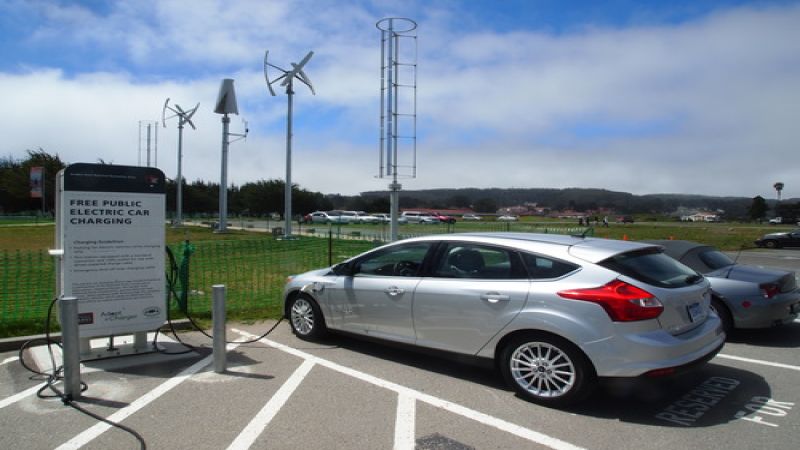How much should it cost to charge an electric car? In most cases public electric car charging stations are free to use, allowing electric car owners to drive for free. However the charging station network operators are beginning to impose fees of $3 per hour or more, which many say is too-high of a fee, begging the question of what's the appropriate fee for electric car charging. To complicate the issue, the cost of electricity for electric car charging is minimal, leaving electric car owners facing a large cost disparity to charge their car between home charging and public charging.
Last winter we wrote about how electric cars are cheaper to operate than gasoline cars, and more recently we noted a cost calculator published by Via Motors showing that commercial fleet owners can save a bunch of money through buying electric, or plug-in hybrid, trucks versus gasoline or diesel powered trucks. How? It's because electricity is a far cheaper fuel than either gasoline or diesel. How? It comes down to calculating the benefit (miles driven) per dollar spent on electricity or gasoline or diesel. This is an "operational cost" line of reasoning, and does not consider the full total cost of ownership. In the case of leasing a plug-in hybrid from a company like Via Motors, the lease cost does a nice job of capturing the cost of ownership and, depending on the usage level, the fuel cost savings can be significant enough to pay for the lease cost.
These savings depend on one thing: Being able to recharge the vehicle using electricity purchased via the price we typically pay the utility company. The national average for electricity is around $0.11 per kilowatt-hour, but varies from locale to locale depending on local utility rates.
When charging your electric vehicle in public the cost can be quite a bit higher than the cost of electricity. When browsing around the charging stations around the U.S., using the ChargePoint application, we see rates vary quite a bit with costs reaching as high as $3.50 per hour. The electric cars on the market either charge at a 3.3 kilowatt or 6.6 kilowatt rates, meaning at the national average for electricity a car charging at 6.6 kilowatts is consuming $0.73, per hour, or so worth of electricity. On the other hand, the car charging at a 3.3 kilowatt rate is consuming half that much electricity, or about $0.36 per hour. These are the electricity rates paid by retail consumers, a charging station business may be paying lower (or higher) electricity rates. In most states charging station owners are not allowed, by law, to charge per kilowatt hour for electricity because that is a right reserved solely to utility companies. Obviously there are costs on top of the electricity, such as leasing the spot for the charging station, as well as paying for the charging station, which must be rolled into the fee required to use the charging station.
In a recent interview with the Christian Science Monitor, Coulomb's CEO Pat Romano acknowledged the rates being charged by some members of the ChargePoint network are excessive. He said that $2 per hour is expensive, but that the pricing will "settle in" as the market matures, as electric car owners become better educated, and charging station owners learn more about the business.
The article goes on to say both Romano and Richard Lowenthal, Coulomb's Founder and CTO, are "advocates of per-kilowatt-hour pricing" for electric car charging stations, and that only 20% of ChargePoint stations are charging fees today. The article notes that in one scenario, a business hosting a charging station, makes economic sense right now because it encourages shoppers to spend more time in the store hosting the charging station. The more time a shopper spends in the store, the more they're likely to spend, especially if they're feeling some responsibility over consuming electricity at that store.
The two then suggest a bit of market activism by electric car owners, which may sound a little curious coming from the executives of the company which runs the ChargePoint network. They suggested that electric car owners should avoid charging stations that require a fee of more than $1 per hour. We, as consumers, have an ability to force market demand to lower the fees imposed by charging station owners. How? Simply by collaborating to eschew charging stations that charge a high fee.
But, you may wonder, are Romano and Lowenthal thinking by making this suggestion? They are the CEO and CTO of the company that runs the ChargePoint network, don't they control the prices to access charging stations? Nope. Coulomb's ChargePoint network is a payment settlement network, and Coulomb does not own the charging stations in the ChargePoint network. Instead the charging stations are purchased by businesses who join the ChargePoint network, and use it for collecting payments. Each charging station owner sets the fee structure as they wish for their charging stations.
The era of free electric car charging at public charging stations may be drawing to a close. Part of the draw to electric cars is not the opportunity to save the polar bears, but to save money on fuel costs. This depends on the fees to charge at an electric car charging station must remain low, but the businesses who would operate those charging stations must stay in business.
Source: Christian Science Monitor












Comments
I'm so glad that you wrote
Permalink
I'm so glad that you wrote this article David. I have been thinking about this for some time and when I brought it up at a local EV Forum in Los Angeles, the general response from gov't and business was that we needed to allow for people to operate in a free market and that charge station operators should be allowed to charge whatever they want.
Well, I guess there is merit to having unwavering free market principles, but as you state, it changes the formula for cost savings over the life of the vehicle. In turn, it makes the sale of an EV that much more difficult in an already challenging time. Overall, I think it does more a disservice than a service to allow for unrestricted charging fees.
It is possible that things will normalize in a natural progression. It seems that wealthier individuals are the ones purchasing EVs, and thus can afford higher charging costs. As costs come down for EVs and the market opens up, perhaps we will see the charge fees naturally lower in response to people's tendency to avoid higher cost stations.
But it is my contention that too much is at stake to allow for this to happen. We don't want to give the anti-EV lobby yet one more reason to spin this phenomenon into a reason why you shouldn't buy an electric car. I think the Mr Romano and Mr Lowenthal understand this and it's this very reason that they almost seem to be speaking out against there own clients. They understand that in order to be successful they can't have a huge barrier to entry that is essentially self-defeating.
--
Also, it is very interesting to note that utilities are the only ones allowed by law to charge by units of energy. I don't think many people know that. We need to continue to press the lawmakers to update the laws to current and new realities.
I am in complete agreement
Permalink
I am in complete agreement with this stance. I own a 2012 Volt, and I will literally go out of my way to patronize businesses who have installed charging stations that operate for free. In our area the electricity is approximately half the national average, at around 6.5 cents/kWh. it costs 21 cents per hour to charge my car. Charging $2/hour is obscene: my car will drive about 13 miles on one hour of charge, and if running on gasoline gets 40 mpg. $2/hour is the equivalent of $6.20/gallon of gasoline for me. I recently drove back to Indiana to visit family. I drove PAST two malls that had $2/hour fees to charge at a mall that was free. while at that mall I dropped over $80 at three different establishments. I am installing a double level 2 charging station at my office in the next 2 weeks, and I plan to offer it for free to anyone who patronizes any of the 4 businesses in our building. I have not decided whether to only have it operate during business hours, but in any event it will not cost the user to charge up.